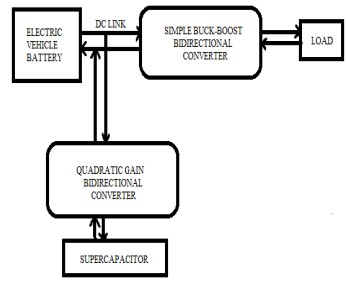Super-Capacitor Assisted Battery System in EV using Quadratic Gain Bidirectional DC-DC Converter
Also Available Domains DC Drives
Objective
The objective of this paper is connect two energy storage systems are connected in parallel, failure of one energy source doesn’t affect the working of the Electrical Vehicle system.
Abstract
In this project, Energy storage systems are gaining importance in the current scenario. To improve efficiency, Hybrid Energy Storage Systems (HESS) are the most researched topic nowadays. HESS make use of one or more energy storage devices utilizing the advantage of each device. Battery super capacitor combination is used in this system. Batteries and super-capacitors require bidirectional converters to charge and discharge according to necessary conditions. The main drawback associated with bidirectional converters are that they require more switching devices to operate thereby increasing the control complexity of the circuit. Here a quadratic gain bidirectional converter is used which has a simpler topology so that only one switch is to be controlled i.e. only one switch is responsible for power flow in Buck and Boost modes. The simulation results are simulated by using MATLAB/SIMULINK Software.
Keywords: Hybrid Energy storage Systems, Bidirectional Converter, Quadratic gain, Buck mode, Boost mode.
NOTE: Without the concern of our team, please don't submit to the college. This Abstract varies based on student requirements.
Block Diagram

Specifications
Software Configuration:
Operating System : Windows 7/8/10
Application Software : Matlab/Simulink
Hardware Configuration:
RAM : 8 GB
Processor : I3 / I5(Mostly prefer)
Learning Outcomes
- Introduction to Matlab/Simulink
- What is EISPACK & LINPACK
- How to start with MATLAB
- About Matlab language
- About tools & libraries
- Application of Matlab/Simulink
- About Matlab desktop
- Features of Matlab/Simulink
- Basics on Matlab/Simulink
- Introduction to controllers.
- Study of PWM techniques.
- Project Development Skills:
- Problem analyzing skills
- Problem solving skills
- Creativity and imaginary skills
- Programming skills
- Deployment
- Testing skills
- Debugging skills
- Project presentation skills
- Thesis writing skills





 Paper Publishing
Paper Publishing
